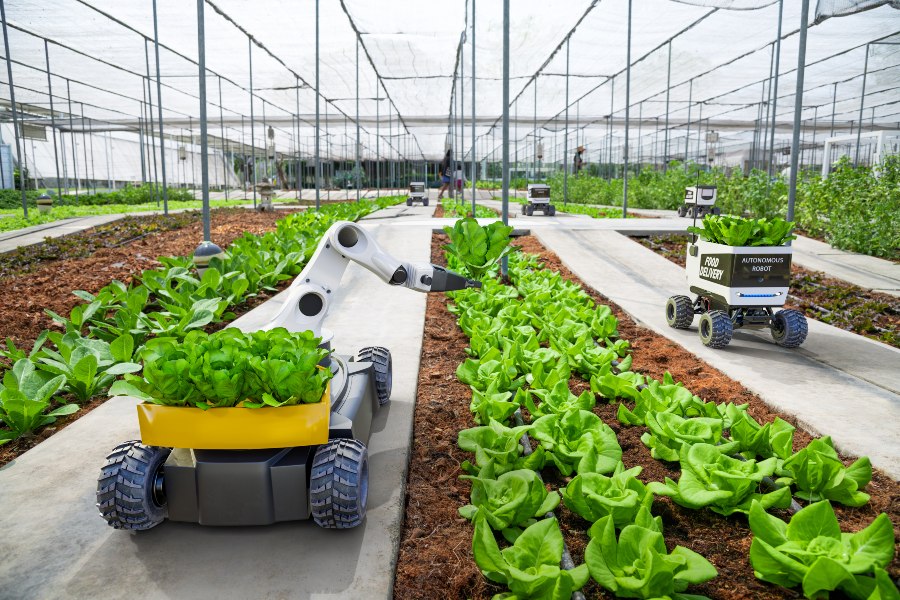Trends and initiatives fostering growth in the Middle East


James Thorpe
Share this content
International Security Journal hears from SSR Personnel’s Peter French MBE and Andrew Hudson.
The Middle East & North Africa (MENA) region has been embracing AI and its subsets, including GenAI, capable of generating text, images or other media, using generative models.
Like with any emerging technologies, though there are concerns, governments and businesses in the region are recognising the potential for good and are investing in their development and implementation.
The UAE has been a frontrunner in the AI race and its government has launched the Strategy for Artificial Intelligence 2031, which aims to position the country as a global leader in GenAI by 2031 and to develop a world class AI ecosystem.
The strategy focuses on transport, healthcare, education and the environment.
Smart Police Stations (SPS)
Dubai opened its first smart police station (SPS) in September 2017.
Today, there are 22 SPS across Dubai, the world’s only unmanned police stations. The SPS is a self-service station where you can register a complaint and 26 defined categories, including criminal records, traffic penalties, community services, certificates and permits.
For complaints and crimes, you can record a video statement and can connect on video with an officer.
One of the key advantages of the SPSs is their accessibility. They are open 24/7, providing round-the-clock access to services.
Furthermore, offering services in multiple languages, with plans to expand to even more languages, ensures that a diverse and multicultural population can interact with the police.
In 2022, there were 107,719 transactions lodged which included 16,083 reports through SPS.
During the first half of 2023, there were 65,942 transactions processed at SPS including 16,205 reports and 4,967 criminal related enquiries.
Due to the nature of not having to interact with another person, Dubai Police has seen a positive impact, with more people now willing to report crimes and use SPS.
This initiative was implemented in line with a focus on digital transformation and for official services to become paperless.
Robotics: A bright future
Dubai’s Robotics and Automation Program seeks to raise robotics’ contribution to The Emirates’ GDP to 9% by 2032; over the next decade, some 200,000 robots will support manufacturing, consumer services, tourism, logistics and healthcare.
The use of robots and automation in the workplace has been increasing in countries around the world. This trend is driven by advancements in technology, increased investment in robotics and the desire to improve efficiency in various industries.
China now ranks fifth in the world behind South Korea (1,000 per 10,000 employees), Singapore (670), Japan (399) and Germany (397).
China and South Korea are the countries that have made the most progress in the race to industrial automation in recent years (Statistica). Many governments are investing in robotics and automation to maintain competitiveness in the global market.
The global robotics market is expected to hit US $275b in 2025. There is a myth that the more robots, the less job opportunities there are for human employees.
Robotics funding is making sure that there is a stable human-machine work ecosystem to drive revenue in advanced robotics countries.
Analytics Insight reports the agricultural sector is encouraging the introduction of modern applications through disruptive technologies with the combination of robotics and AI.
Farmers are reaping the benefits of robotics applications in the global agricultural sector to drive revenue and accelerate the productivity of different high quality crops utilising multiple kinds of robots.
According to GlobalData, the service robotics market could reach US $216b by 2030. It is growing at a compound annual growth rate of over 20%.
This expansion has become evident in the Middle East. In the region, industries are turning to robotics to boost operations. Additionally, public and private entities are injecting more investments into the sector.
Recently, a consortium that includes Prosperity7, Aramco’s investment subsidiary, invested $150m in Jaka Robotics.
The Chinese startup specialises in building collaborative robots, ‘cobots’, designed to work alongside humans. These cobots enhance capabilities rather than operate in isolation.
In the UAE, some facilities management companies are aiming to have one third of their labour force replaced with robots by 2025.
This will help the country with its Dubai Robotics and Automation Program 2031, which aims to increase the robotics sector’s contribution to the GDP by 9% by 2032.
Bahrain has set a target to build 300 smart factories by 2026 as part of its iFactories initiative.
Digital transformation
Digitalisation and digital transformation are seen as an important part of the 2030 Vision by Saudi Arabia’s government in which they are on track to diversify their economy and boost the contribution of the private sector towards national GDP.
The continued development of a localised fourth industrial revolution will propel the Kingdom’s shift towards an innovation-driven economy.
So far, the plan is on course, with the digital sector in Saudi Arabia valued at US $40b and is comprised of 318,000 jobs; Public Investment Fund will invest US $24.7b towards GenAl and robotics technology by 2025, making it among the highest government expenditure on tech in the world.
Digitalisation has been at the forefront of many Middle East government strategies over the years. In the UAE, government services across the country continue to advance their digital strategy and offerings.
The digital economy strategy has been launched, which aims to double the GDP contribution of the digital economy. In Dubai, government services are nearly fully digitised.
The paperless government strategy is well on its way, with an implementation rate of 99.5% in terms of delivering services, ensuring that Dubai is seen as one of the leading digital cities in the world.
Hamad Obaid Al Mansoori, Director General, Digital Dubai has said Dubai is on track to “usher in an advanced digital future and raise its status as a global exemplar for digital governance”.
The aim for Dubai is to grow the technology economy by 200% and raise the city’s ranking on the UN’s Local online service index (LOSI).
Several local universities have started offering courses catering to digital transformation requirements. The University of Fujairah has announced two courses to begin the next academic year: A Bachelor of Computer Science in Artificial Intelligence and Machine Learning and a Bachelor of Computer Science in Data Science and IoT.
In Saudi Arabia the National Transformation Program (NTP), launched in 2022, has had a strong impact, with 6,000 government services available digitally, accounting for 97% of all government services.
A sustainable transformation environment has been laid by the NTP which is trying to integrate the fourth industrial revolution technologies and e-government services.
Aside from government services, digital adoption and online spending continues to grow across the Middle East.
The fast pace of growth in digital adoption has put the region on par with major economies in Europe and North America. The UAE has the highest degree of digitalisation in the region, with 99% of the population having internet access.
Saudi Arabia ranks next with 90% whilst Egypt comes in third with 71%. However, Egypt is seen as the country in the region with the greatest potential to grow its digital capabilities (McKinsey).
Apps are leading the way in the Middle East, with most opting to go mobile first, outpacing website use. Saudi Arabia has the highest app engagement in the region, with more than 50% preferring apps, followed by UAE at 45% and Egypt at 40%.
The app use in these countries is 1.6 times higher than in the markets of Europe and North America.
Acknowledgements: Tarry Singh, AI Researcher & CEO, DK AI Lab, Analytics Insight, Middle East Economy

